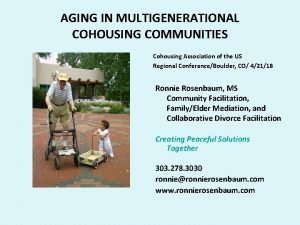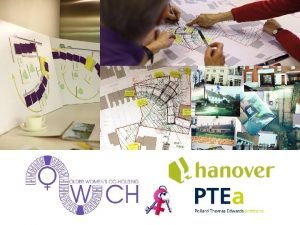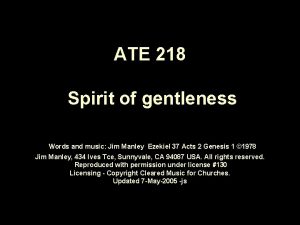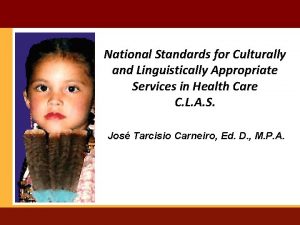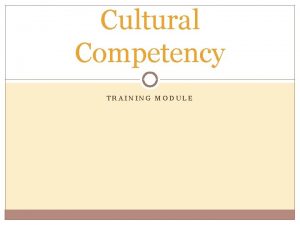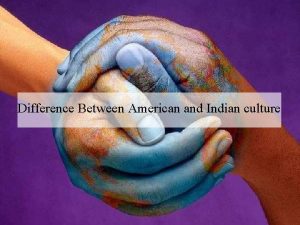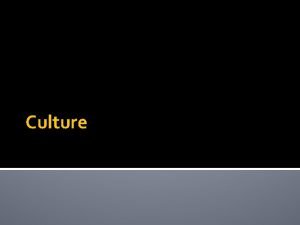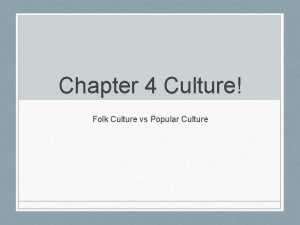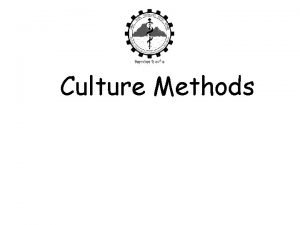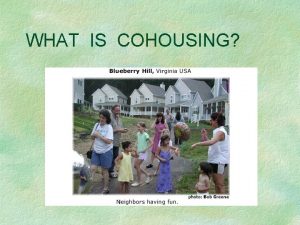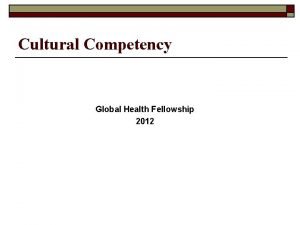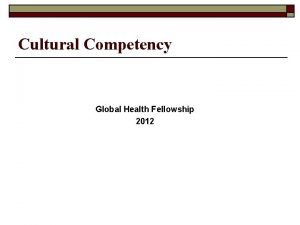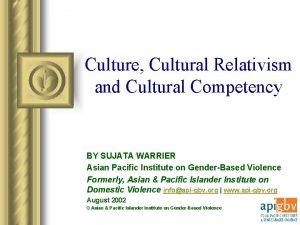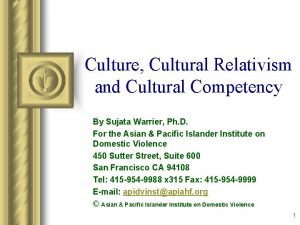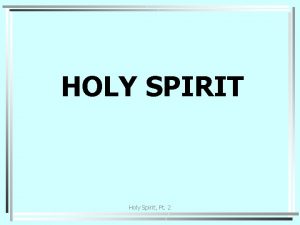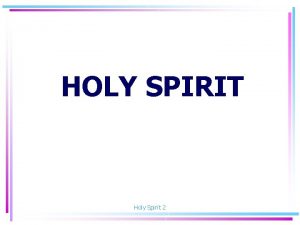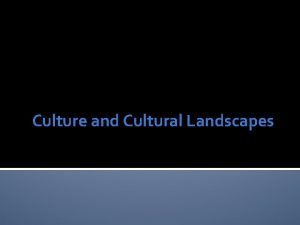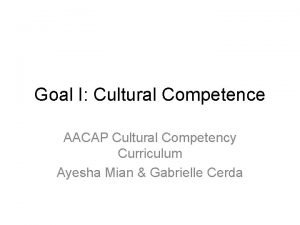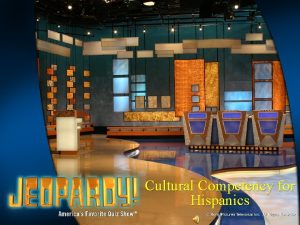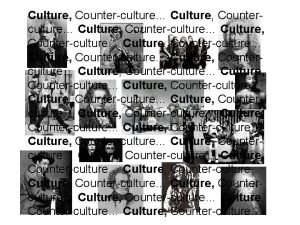The Spirit of Culture Cultural Competency and Cohousing


















- Slides: 18

The Spirit of Culture Cultural Competency and Cohousing Alan O’Hashi, MPA www. alanohashi. com www. bouldercomedia. com adoecos@yahoo. com 303 -910 -5782

A little about the workshop Getting along with one another and valuing differences are important skills when joining the American version of cohousing. In this interactive workshop: o Participants will be led through a personal journey about how their pasts inform the present and how to move into the future. o Participants will learn skills and ideas, including the importance of a “higher purpose” to assist their communities function more efficiently by getting to know their neighbors by knowing themselves better.

A little about the facilitator About the Presenter, Alan O’Hashi (Silver Sage Village Senior Cohousing) I provide tailor-made cultural competency training and facilitation – short term, half day / full day. My work includes training for a variety of groups, including youth services, victim services and three housing organizations in Denver. I’m a graduate of the Visiones Advanced Leadership Training which develops transformational leadership skills and consensus - building. I represent the Rocky Mountain Region on the Cohousing USA Board of Directors; previously was a member of the city of Boulder Planning Board, formerly the Executive Director of Habitat for Humanity St Vrain Valley – Longmont, Colorado. These days, though, I make movies. The most recent is “Aging Gratefully: The Power of Community” about cohousing. “Mahjong and the West” about dating violence now has Amazon and Vimeo video on demand distribution. I’m currently working on documentaries about the “Art of the Hunt”, “New Deal Art in Post Offices” and “Plein Air painting on the Grand Teton”. I also provideo production services for businesses and non-profits wanting to tell their stories better.

Norms and Expectations Be respectful – speak one at a time Be good listeners Use ‘I’ statements There are no ‘mistakes’ Challenge by choice What happens in Vegas, stays in Vegas

Who’s in the house today? Please introduce yourselves: o Do you now live in cohousing or thinking about it, or a reformed cohouser … o Give your grandmother’s birth (née) name

What is culture and why do they exist? Cultures are many and generally defined as race, ethnicity, practices and values that are common for a certain group of people possibly around a higher purpose. For cohousing, culture may include: o Familial and non familial networks o Association patterns: formal, informal relationships, friends, allies, neighbors, cliques o Roles around gender and age: respect of elders o Food traditions: common foods, meals, o Life transitions: birth, death o Spirituality: individual vs collective o Core values: independence, interdependence, individuality, boundaries, consequences. accountability o Diverse Personalities: control freaks, slackers, over achievers, introverts, extroverts, liars

Diverse Personalities

Diverse Personalities

What is cultural competence? In the context of cohousing, cultural competence is a developmental process that evolves over an extended period. At any given moment, depending on past histories and experiences individuals and cohousing communities are at various levels of cultural awareness, knowledge and competency skills. Where does cultural competence begin? o Name a person, not a relative, who was a positive influence on you as a child and a particular incident that you continue to carry to this day?

Who and what are you? Relating about who helped you grow up to be healthy and strong is a starting point. As of now we can move forward with each passing moment while reflecting on the past and how those experiences influence the future. o Shields are symbols of self and community. o A way to identify from ancient times to now. o Remember your past and how that influences your future.

Your shield Draw a square on a piece of paper Divide it into quarters Write / draw your responses Self Identity – race, gender identity, Self Identity? etc. Two Holidays – one you celebrate now that you didn’t as a kid; one you’ve always celebrated Housing – What type of house did Two Holidays ? Bread? you live in before your current home Food – The type of bread you ate growing up Housing?

Diversity vs. Cultural Competence Diversity consists of the characteristics of a cultural group o Not a very practical approach, daunting o How many versions of Christianity, Spanish dialects, ethnicities? o Book-learned, not necessarily personal change o Unintentional stereotyping Cultural competence is self guided work each of us undertakes to explore their own pasts, values and cultural baggage o Shedding learned behaviors, also daunting o Cultural Competence Netweavers o Recognize privilege, dominant cultural norms, sacrifice, change one’s self o Facilitated, over time: goal setting, implementation

Stereotyping – The Lunch Date Stereotyping is making assumptions and judgments about a group of people based on incomplete and/or inaccurate information: o o o “Diversity at cohousing is a parking lot with Subarus of three different colors” “At our cohousing, we have all kinds of people, some even watch TV. ” “We’re all Caucasian, but come to find out we all went to different colleges. ”

Stereotyping – the Martians • Exercise: Schuyler and Casey just walked out of the movie theater in the Martian neighborhood. o When they get to the car, Schuyler notices that Casey’s bag is missing o It’s late at night and Martians are known to steal valuables. o Both recently completed some cultural competency training. o How should they react when they return to theater and talk with the manager?

Cultural Competence & Cohousing started in Denmark which is more of a socialistic and relatively a racially homogeneous country. o o Do you like theoretical idea of a multicultural community or are you willing to accept the difficult and possibly painful personal work that goes into creating one? Does cohousing fit with American social DNA – rugged individualism, bigger is better? Federal, state and local fair housing laws set high bars with regards to no discrimination o Truly, the only group who can self select are the first members forming a community Public and private “affordable” and “lower cost” housing o o o Sometimes deed restricted forever as permanently affordable Habitat for Humanity model Generally grants and loans from public and private sources Homogeneity in housing costs and sizes o o More like the Denmark model where homes are very similar and the members are very similar Think twice about mixing $1 million and $150000 homes

Culturally Competent Cohousing Ideas Multicultural outreach through cultural brokerage o You and your community decide to embrace cultural competency o Adopting a “higher purpose” for your community beyond maintaining the common property and property values o Create formal and informal partnerships with diverse individuals and organizations o When ‘dominant culture’ members outreach, it is likely well-intentioned, but viewed as paternal and acts of tokenism Transactional vs transformative governance o Transactional Top down management – leader defines goals, leader gives “rewards” in exchange for performance. Leaders run afoul with unwilling followers (Consensus In Name Only - CINO) o Transformational Bottom up management – shared consensus-based leadership; leader(s) help the group move beyond self interest to shared goals; articulated shared visions (true consensus decision making)

Cultural Competence Commitment Did you learn anything about yourself that can either help or hinder your cultural competency journey? Are there current beliefs formed by your past that you will try to ‘undo’ as you move forward? Are you willing to put in the time and effort become a more culturally competent person and walk your talk? Is a culturally competent cohousing community something you want to embrace and nurture?

Need help with community building or video production? For more information: Alan O’Hashi adoecos@yahoo. com 303 -910 -5782 www. alanohashi. com www. bouldercomedia. com
 Multigenerational cohousing
Multigenerational cohousing Scrd grant in aid
Scrd grant in aid Older women's cohousing
Older women's cohousing Wolf creek lodge grass valley
Wolf creek lodge grass valley Come holy spirit dove divine
Come holy spirit dove divine Spirit spirit of gentleness
Spirit spirit of gentleness Cultural competency staircase
Cultural competency staircase Why is culture identity important
Why is culture identity important Spirit animal cultural appropriation
Spirit animal cultural appropriation Material culture example
Material culture example Batch culture vs continuous culture
Batch culture vs continuous culture Indian culture vs american culture
Indian culture vs american culture Uses of selenite f broth
Uses of selenite f broth Folk culture and popular culture venn diagram
Folk culture and popular culture venn diagram How does popular culture diffuse
How does popular culture diffuse Anaerobic media
Anaerobic media Homework due today
Homework due today Stab culture and stroke culture
Stab culture and stroke culture Lawn or carpet culture
Lawn or carpet culture
